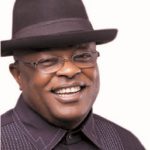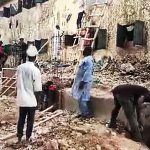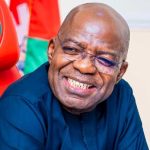Okowa as Governor: It’s six years like six decades
July 21, 2021
Governor Okowa’s six years looks like six decades to some of us who had been around in the state. What he has achieved in six years is what would have taken some other leaders six decades to achieve. He built schools including technical colleges as we used to know them of old; he built roads and bridges in both urban and rural areas including riverine communities in a manner no leader has ever done.

When the National Bureau of Statistics, NBS, released the 2020 National Poverty Index which saw Delta State leapfrog to second least poorest state (state with lowest number of poor people) in Nigeria, it came as no surprise to many Deltans. By 2010, Delta was ranked 10th. It is now classified as second least poor state. And this is happening at a time of low ebb in global economy; at a time of depleting foreign reserve for the country, at a time of very low crude oil price in the international market which translates to low revenue to states and the federal government. During this period, particularly within the last two years, many states could not pay basic salaries let alone embark of major capital projects. But that was the time Dr. Ifeanyi Okowa, governor of Delta, revved up development in the state.
Many linked the state’s movement from the high poor belt to the least poor bracket to efficient public finance management, productivity-oriented economic policies, effective multi-sector interventions, youth-targeted job and wealth creation initiatives and conscious effort at diversifying the state’s economy through agriculture. But some Deltans believe it is far more than these. They attribute the jump and general improvement of the state’s economy to probity and prudence in fiscal management as well as a carefully calibrated prioritisation of development programmes embarked upon by the governor.
Working on the development blueprint captured in his SMART programme to build a Stronger Delta, Okowa strategically moved the state away from over-dependence on oil money. The diversity of Delta ecosystem is such that it is both riverine and upland and it has the capacity to support agriculture in diverse crop and animal farming namely: Cassava, rice, yam, tomato, oil palm production as well as in aqua-culture (fishery), piggery, poultry, among others.
The governor’s bullish construction of roads and bridges in the state which earned him the moniker, Roadmaster, also helped to contribute to the state’s economic stimulation. The completion of 799 civil infrastructure projects including the construction of 5 bridges (15 more ongoing), 1,577.8 kilometres of roads and 908.8 kilometres of drainage channels has not only helped to reduce infrastructure deficit as well as encourage commuting and movement of goods and services across the state, it has remained a reference point in infrastructural development in the history of the multi-city state .This coupled with the wide-ranging initiatives in job and wealth creation especially among the youths galvanised activities in the non-oil sectors.
The resultant impact was a growth in the size of the state’s economy beating every odd and surpassing earlier projections despite a general cloudy economic environment that stymied economic growth at the national level and in most states. For instance, the state’s economy nosed up from N2.96 trillion in 2015 to N4.47 trillion in 2019, amounting to a jump by 51%. Analysts have rated the growth as phenomenal especially taking cognisance of the economic recession that whittled the nation’s growth between 2015 and 2016. This impressive economic performance has been attributed to innovative economic policies, institutionalisation of best practices in governance and fiscal prudence. But much more as a result of the government’s deliberate push which created and expanded new frontiers in non-oil sectors.
The deliberate investment in agriculture created a buffer for the state against the dwindling revenue from the federation account. For a state steeped in subsistence farming over the years, Okowa brought a paradigm shift in agriculture with the introduction of youth-focussed initiatives one of which is the Youth Agricultural Entrepreneurs Programme (YAGEP). It was one of the programmes to actualize his promise of ‘Prosperity for all Deltans’. The YAGEP programme offered a safety net to rein in the youths, got them actively engaged such that they were able to turn their youthful energies and feisty fervour into productive ventures in agriculture. Under YAGEP, a total of 893 previously unemployed youths were effectively trained, empowered and settled in 25 farm clusters across the state over three successive years (cycles) spanning from 2015 to 2018. The involvement of these youths in agriculture soon turned them from job-seekers to wealth creators and employers of labour. And this gave a fillip to a holistic improvement of the agriculture value chain. The overall impact was that agriculture GDP rose from N432 billion in 2015 to N583 billion in 2019, an impressive leap of 35%. Officials of the state government said this growth could have been more but for the massive flooding in 2018 and the scourge of insecurity visited on the state, especially farmers, during the period by armed herdsmen.
Evidence of the impact of YAGEP on the economy is captured in the data released by the National Bureau of Statistics (NBS) which showed that the agricultural sector in the state grew at an annual average of 13.3% from 2015-2017, compared to 8.6% from 2013-2015. The growth has remained on the ascendancy with every passing year.
Between 2015 and 2020, the government created over 100,000 direct jobs including entrepreneurs and over one million indirect jobs arising from various interventions and infrastructural development in the state. Some of the MDAs that created direct jobs include Job and Wealth Creation Bureau, Ministry of Youth Development, Ministry of Women Affairs, Ministry of Science and Technology, Girl Child Empowerment Office among others.
The governor’s focus on rural folks, women and the girl-child has been legendary. Using the Rural Youth Skills Training programme (for youths resident in the rural communities with basic knowledge in chosen trade/enterprise); Girls Entrepreneurship and Skills Training (GEST) programme (for young ladies between ages 18 and 30); and, the Women Entrepreneurship and Skills Acquisition Programme (WESAP), Okowa has empowered rural dwellers including women. For instance, he gave a boost to the making of Akwa-Ocha (White Cloth), the popular traditional hand-woven cloth common among the Anioma people of the state which is being exported to different parts of the world to Diaspora Anioma people, their friends and those who are thrilled by the tapestry and grandeur of the intricately woven piece of cloth. Before now, Akwa-Ocha was made using local looms and it was done mostly by old women without any plan of sustaining the art through the coming generations. But Okowa has modernised the operations thus enhancing efficiency including speed of production and splendour of the final product which translates to more money for those in the business. Besides, the government has made it attractive to the younger generation through the Delta Fabric (Akwa-Ocha/Akwa-Oma) training programme at the Accelerated Delta Innovation (Leather works/Shoemaking Factory) in Issele-Uku, Aniocha North LGA. All the youths trained at the factory were also given starter-packs.
Youth empowerment is high on Okowa’s agenda as their engagement would engender peace in the state. To this effect, the government has initiated a lot of skills acquisition projects to get the youths meaningfully engaged. Programmes such as ICT-Youth Empowerment Programme (ICT-YEP), Rural Youth Skill Acquisition Programme (RYSA) have become veritable vehicles for youth empowerment.
To sustain the policy on youth empowerment, the Directorate of Youth Monitoring and Mentoring (DYMM) was established in 2016 to monitor the training activities of agencies that have to do with job and wealth creation in the state. The fact that Delta maintained first position consecutively in the last three National Sports Festivals attests to an actively engaged youth population.
A youth leader and grassroots mobiliser in Ubulu-Uku, Aniocha South local government area of the state, Mr. John Nwajei, likened Okowa’s six years in office to six decades. “Governor Okowa’s six years looks like six decades to some of us who had been around in the state. What he has achieved in six years is what would have taken some other leaders six decades to achieve. He built schools including technical colleges as we used to know them of old; he built roads and bridges in both urban and rural areas including riverine communities in a manner no leader has ever done. He built hospitals, houses and he built humans. He turned our youths from crime and street lives to productive ventures,“ he said when he addressed some youths in his community ahead of the local government election which held earlier this year.
Governor Okowa’s peerless stride in infrastructure development has continued to draw top politicians and thought leaders in the nation to Delta State to perform commissioning ceremonies or flag-off of projects including the multi-purpose state secretariat, concessioning of a hugely rejigged Asaba International Airport, Stephen Keshi International Stadium, hospitals, schools, a brand new High Court complex after the old building was razed during the EndSARS protest, roads and bridges in all parts of the state.
Under Okowa, Delta has positioned itself to retrieve its old glory as the birthplace for academic excellence and breeding ground for fecund minds. The state now has four state government-owned universities (Abraka, Agbor, Asaba and Ozoro), two polytechnics, (Ogwashi-Uku, and School of Marine Technology, Burutu), two Colleges of Education (Warri and Mosogar), well-equipped technical colleges, four schools of nursing/midwifery (Eku, Agbor, Ughelli and Asaba); in addition to two federal universities (Effurun and Okerenkoko), five private universities (Ogume, Ibusa, Kiagbodo, Oghara and Agbara-Otor) and two private polytechnics (Agbor and Owa-Oyibu). All these are geared towards entrenching the total man concept of human capacity development.
Former President of the Senate, Dr. Bukola Saraki in a foreword to a special publication on Okowa’s leadership wrote: “Governor Okowa has stabilized the polity despite the daunting security challenges that have enveloped the country through a combination of persuasive engagements and job creation. All of these have resulted in an impressive GDP spanning over five years that have witnessed a significant growth (52.8%) of the non-oil sector as against oil and gas (47.2%) in 2019. Services accounted for 34%, Agriculture 13% and manufacturing 5.4%. Given the huge youth population and growing unemployment, his interventions in job and wealth creation have been complemented with 19 new technical colleges to provide a skills base and promote self-employment.”
Former president, Chief Olusegun Obasanjo, Governors Udom Emmanuel, Samuel Ortom, Godwin Obaseki, Douye Diri and other elite Nigerians have visited Delta at various times to commission projects across the state. It’s a mark of productivity of the Okowa government.
- Author: Kenneth Orere, Public Policy Analyst, writes from Warri








